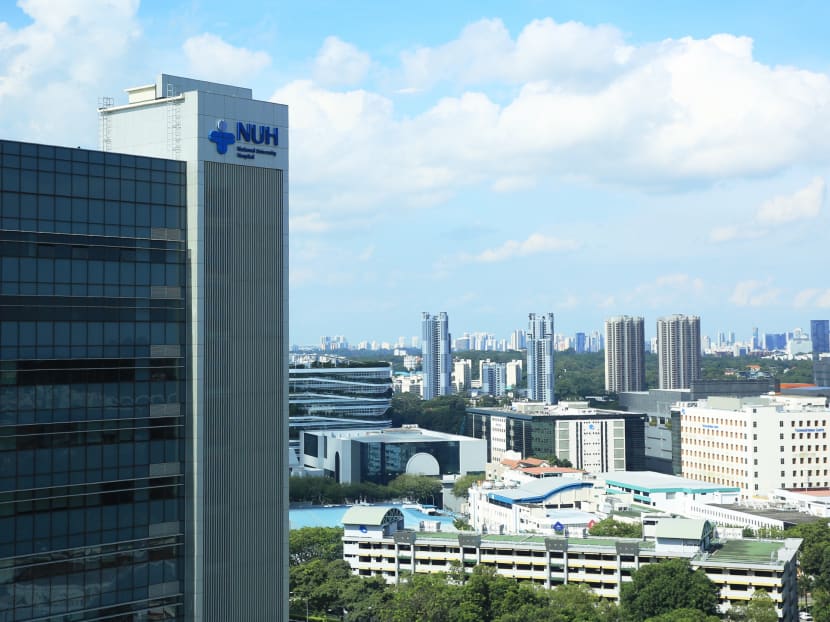2 more public hospitals to start registering visitors
SINGAPORE — To beef up security and enable contact-tracing in the event of an epidemic, visitors to two more public hospitals here will soon have to register and get their identity cards scanned at gantries before getting into wards.
SINGAPORE — To beef up security and enable contact-tracing in the event of an epidemic, visitors to two more public hospitals here will soon have to register and get their identity cards scanned at gantries before getting into wards.
The hospitals to go under the protocol are Khoo Teck Puat Hospital (KTPH) and the National University Hospital (NUH), which join Changi General Hospital, Singapore General Hospital, Ng Teng Fong General Hospital (NTFG) and Tan Tock Seng Hospital.
KTPH will start to register visitors to wards “over the next few months”. Automated gantries will be up by early next year, said the hospital’s spokesperson in response to TODAY’s queries. Since last year, the hospital’s security had partnered with the police to patrol its wards once a month. It plans to increase the frequency of such joint patrols. “For the safety of everyone in the hospital, KTPH conducts regular reviews to enhance our security measures … These ongoing enhancements are in line with MOH’s (Ministry of Health) advice in light of the heightened security risks in Singapore and around the world,” said the spokesperson.
NUH will also be implementing a new system next year to “register and manage visitors to the wards”, so that it can provide patients with an environment more conducive to recovery, said an NUH spokesperson.
“(NUH) has in place security measures that include surveillance via CCTVs, patrols and immediate responses to security incidents by security personnel, and access controls against unauthorised entry to restricted and sensitive areas … There are also ongoing efforts to raise staff awareness on the need to remain vigilant,” the spokesperson said.
The issue of safety in public hospitals, and how prepared they are in tackling a terrorist attack, was raised in Parliament last week, with Health Minister Gan Kim Yong noting that hospitals conduct regular training and exercises, including with the Home Team forces.
In a written reply to a question tabled by Nominated Member of Parliament K Thanaletchimi, Mr Gan said his ministry is working with the Ministry of Home Affairs on the security protection of the public hospitals here.
“In the event of a security incident, our public hospitals are resourced with their own security personnel on site who can provide immediate response to ‘deny, delay and contain’, while waiting for the arrival of Home Team quick-response forces where necessary,” Mr Gan said in his reply.
Employees at KK Women’s and Children’s Hospital told TODAY they had observed gantries being set up and then taken down earlier this year, but the hospital was unable to share any official details at press time.
Alexandra Hospital’s spokesperson declined to comment, noting that the hospital will soon be moving out of its current premises. “With it being handed over to another healthcare institution, there will be several rounds of changes to the security measures,” she said.
Alexandra Hospital, which is being run by Sengkang Health, will move to Sengkang General Hospital next year when the new building is ready. The Queenstown campus, which Alexandra Hospital is currently occupying, will then be handed over to the National University Health System.
Hospitals that have already implemented some form of visitor management system said it has helped improve patient welfare and security.
SGH, for instance, started a system in 2012 that allows each patient to receive a maximum of four visitors at any one time during visiting hours.
Visitors to wards and outpatient facilities located beyond the gantries must register by providing an identity card, as well as the name and bed number of the patient they are visiting. This can be done online, or at registration counters and self-registration kiosks at four blocks in the hospital. The hospital is exploring other e-registration platforms but is unable to share more details at this point, it said.
Mr Peter Tay, SGH’s deputy director for operations support, said: “The visitor management system has helped to better manage the number of visitors in the wards, especially when SGH has patients with complex medical conditions and weaker immunity. This will allow our patients to get the adequate rest needed to recover, and reduce any potential exposure to infection from external sources.”
A similar procedure is in place at NTFGH, which opened in 2015, where up to four registered visitors are allowed at general wards, and the intensive care and high dependency units.
At the isolation, ambulatory, endoscopy and kidney units, the maximum number of registered visitors is halved. When a patient has received his or her maximum number of visitors, the next visitor will be placed on a waiting list, and a text message will be sent to the first person on the waiting list as soon as a slot is available. Those accompanying patients for day procedures and appointments at the ambulatory, endoscopy and kidney units must also register. Staff are required to enter and exit via these gantries, too.
Mr Ng Kian Swan, chief operating officer of NTFGH and Jurong Community Hospital (JCH), said the system aims to facilitate “sufficient, undisturbed rest” for patients, as well as to give doctors and nurses time and space to carry out their duties. He added: “(The visitor management system) also facilitates contact tracing if needed, should there be a pandemic situation. As NTFGH and JCH are also connected to the surrounding malls through convenient link bridges, (the system) is an added security to prevent unauthorised access into the wards for patients’ comfort and safety.”







